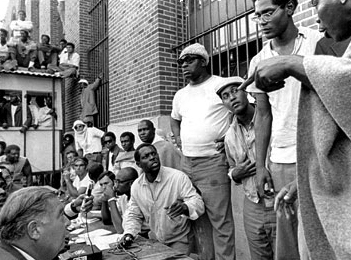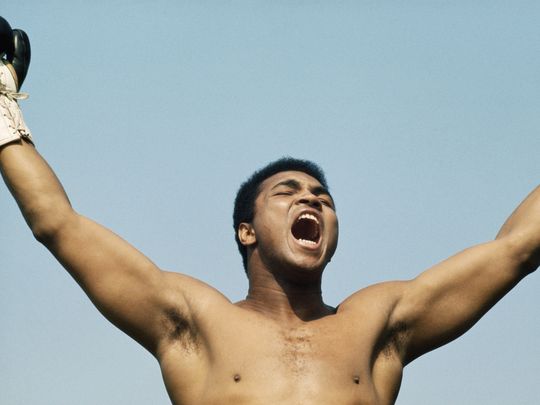By: Zachary Draves
Beginning Sept. 9 and ending on Sept. 13 1971, the Attica Correctional Facility in upstate New York became the site of the most famous prison rebellion in American history.

(Courtesy: Timeline)
During that four-day siege, prisoners boldly took control of the facility to protest the deplorable conditions such as adequate health care, being confined to their cells for nearly entire days, restrictions on visitation to name a few.
All of which was very much intersected with racism considering that the majority of the prisoners were black and brown.

(Courtesy: Zinn Education Project)
They published the following manifesto:
We, the men of Attica Prison, have been committed to the New York State Department of Corrections by the people of society for the purpose of correcting what has been deemed as social errors in behavior.
The program which we are submitted to under the façade of rehabilitation is relative to the ancient stupidity of pouring water on a drowning man, inasmuch as we are treated for our hostilities by our program administrators with their hostility as medication.
In our peaceful efforts to assemble in dissent as provided under this nation’s U.S. Constitution, we are in turn murdered, brutalized, and framed on various criminal charges because we seek the rights and privileges of all American People.
In our efforts to intellectually expand in keeping with the outside world, through all categories of news media, we are systematically restricted and punitively remanded to isolation status when we insist on our human rights to the wisdom of awareness.
After four days of negotiations, Gov. Nelson Rockefeller ordered that the prison be retaken and in doing so allowed for state police to shoot and kill 39 people in a 15-minute onslaught.
The notion that inmates took matters into their own hands of this magnitude was unheard of and foreshadowed the ongoing struggle against the prison industrial complex and reckoning with unjust draconian drug laws that have resulted in disproportionately black and brown bodies being confined to cages.
The siege on Attica was so powerful that it got the attention of the most famous man on the planet, Muhammad Ali.

(Courtesy: WHAS11.com)
It just so happened that this occurred during the same year that Ali was unanimously vindicated by the Supreme Court for refusing military draft on the grounds of his religious beliefs, so the sociopolitical context was fitting.
One year later, Ali traveled to Ireland to fight Alvin Lewis and while being interviewed on a television program that was dedicated to his career and activism, he shared the following poem about Attica.

(Courtesy: Youtube)
For Attica.
Better far from all I see
To die fighting to be free
What more fitting end could be
Better surely than in some bed
Where in broken health I’m lead
Lingering until I’m dead
Better than with prayers and pleas
Or in the clutch of some disease
Wasting slowly by degrees
Better than by heart attack
Or some dose of drug I lack
Let me die by being Black.
Better far than I should go
Standing here against the foe
Is there sweeter death to know
Better than the bloody stain
On some highway that I’m lain
Torn by flying glass and pain
Better call on death to come
Than to die another dumb
Muted victim in the slum
Better than of this prison rot
If there’s any choice I’ve got
Kill me here on the spot
Better for my fight to wage
Now while my blood boils with rage
Lest it cool with ancient age
Better violent for us to die
Than to Uncle Tom and try
Making peace just to live a lie
Better now that I say my sooth
I’m going to die demanding truth
While I’m still akin to youth
Better now than later on
Now that fear of death is gone
Never mind another dawn
*Machine gun fire*
They opened fire on them
But they died telling it like it was
This was a lesser-known example of Ali’s public solidarity with the oppressed and a testament to what he actually represented.
“Muhammad Ali was not only the GOAT in the ring but also one of the most significant figures in the black freedom struggle” says Jesse Hagopian, a history teacher and co-adviser to the Black Student Union at Garfield High School in Seattle, WA who also serves as an organizer for the Zinn Education Project.
“It is an incredible legacy he leaves in terms of using his platform that sports provides athletes to not just entertain America but to challenge a nation that was founded on structural racism.”
Too often Ali’s legacy has been grossly whitewashed and watered down to perpetuate a narrative about his life that was not accurate and does a great disservice to him.
Once Ali was weakened by Parkinson’s disease to where he could no longer speak, he suddenly became the most beloved person on planet earth once he lit the torch at the opening ceremonies of the Atlanta Olympics in 1996 and all that he had contributed to the cause of freedom and liberation was all but forgotten for the most part.
It is very easy to be captivated by this shiny object that we forget that when Ali was at his peak and speaking truth to power he was vilified by mainstream society.
The real truth is that Muhammad Ali was a revolutionary and was uncompromising and unapologetic in that role and the 50th anniversary of Attica and his commemoration should remind us all of who he was.
I am America.
I am the part you won’t recognize.
But get used to me:
Black, confident, cocky.
My name, not yours.
My religion, not yours.
My goals, my own.
Get used to me.
-The Champ